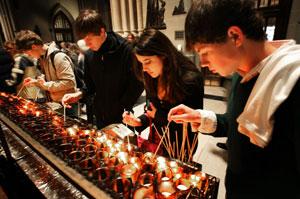 Last month I read through Young Catholic America. It’s a new study that looks at the faith lives of young emerging adults in the United States. Overall it’s a fascinating work, which I think everyone that has a vested interest in the Church should read. It looks at the exodus of young people from the Catholic Church and identifies the sorts of things that contribute to why people stay, what sorts of situations make it likely young people will leave, and the kinds of situation in which young people become more involved.
Last month I read through Young Catholic America. It’s a new study that looks at the faith lives of young emerging adults in the United States. Overall it’s a fascinating work, which I think everyone that has a vested interest in the Church should read. It looks at the exodus of young people from the Catholic Church and identifies the sorts of things that contribute to why people stay, what sorts of situations make it likely young people will leave, and the kinds of situation in which young people become more involved.
It’s a limited study, insofar as it only traces the faith lives of students from their adolescent years through their early 20s and so it can’t speak to what might happen to students in the years that follow emerging adulthood. It does not seek to identify what the future holds, but simply to highlight how emerging adults engage with the Catholic Church in this time and place.
After reading the book, I have a few take aways that I’ll share. If you have a change to read the book please let me know what you find interesting.
- Faith is best understood in context – One of the great things about the book is that it doesn’t just look at how different factors impact how people identify with the Catholic Church, it also identifies which “combos” impact people. I won’t get into all the details about these but it’s fascinating to see the unexpected things that happen when particular combinations come together.
- The family is still key – More than anything the primary factor is parents. Your kids will generally only be as faithful as you are. If you make faith an important part of family life in the teen years, your kids will probably keep the faith in their adult years. If you don’t, it is almost certain (statistically) they won’t either.
- We get confirmation totally wrong – Over and over I was struck by how our current practice of confirmation gets things totally wrong. Confirmation is treated as graduation not commissioning. People only seem to go to church until their kids are confirmed. People stop taking responsibility for their kids faith after confirmation. People don’t teach the faith at home because they think that the preparation for the sacraments takes care of it. All of these things contribute to young people walking out on the church. I personally think we should return to having all three sacraments of initiation (Baptism, Eucharist, and Confirmation) done together as was done for the first centuries of the church in Rome, and how it is still done in Eastern Catholic Churches. Perhaps, then, we can finally start to use the sacramental life of the church as a continual source of the chatechetical life of the church instead of the momentary awards given to those who jump through ecclesial hoops.
- One person can make all the difference – Another amazing thing the study shows is the power of relationships. Students who had even one strong relationship to a person who had a strong Catholic faith were much more likely to identify as Catholic themselves. Investing in the life of a young person can make all the difference. I can personally attest to this in my own life.
- The liturgy is powerful – One of the only things that seems to deepen a person’s commitment beyond that of their family of origin seems to participation in the liturgy. Going to Mass deepens one’s faith more than youth group, mission trips, Catholic education, or Catholic School.
- They don’t ask the right questions – Repeatedly the conclusion is drawn that the major shift in generational understandings of the church was made in the post-concilear milieu of the Baby-Boomers’ coming of age. The reason for this conclusion is linked to the fact that many of the emerging adults answer questions about liturgy and doctrine in much the same way their parents did. I think this conclusion is perhaps the most misguided of the book. It asks the questions that were formative for bloomers, but does not address the questions which are relevant to millennials. This issue is far deeper than I have time for here, but I would recommend reading this article on some of the fundamental shifts in how people read within the new social media mindset. Another trend that was not really addressed is raised in this article, which indicates that as a third of those who leave churches have done so because of how it addresses homosexuality. These are just a couple examples of the different sorts of questions being asked. I don’t feel enough time was taken to explore the questions millenials are actually asking in the study. Instead they were given the questions that their parents wrestled with, and naturally the answers they inherited were given. This does not mean that this generation isn’t undergoing a radical shift… it just means the shift is concerned with fundamentally different things.
Overall the book is a must-read for people working within the Catholic Church. Pick up a copy!












